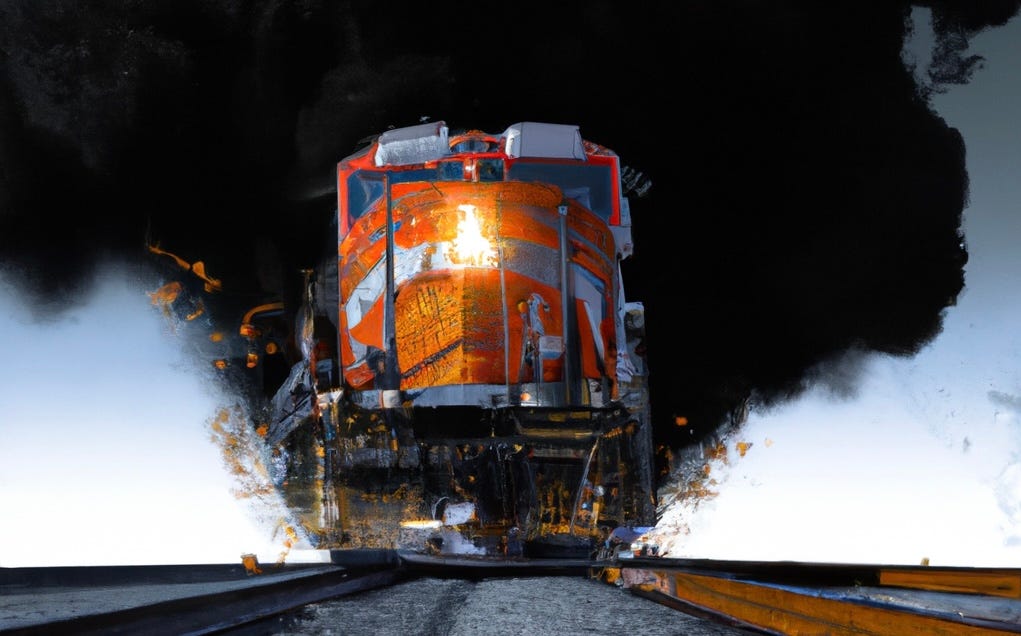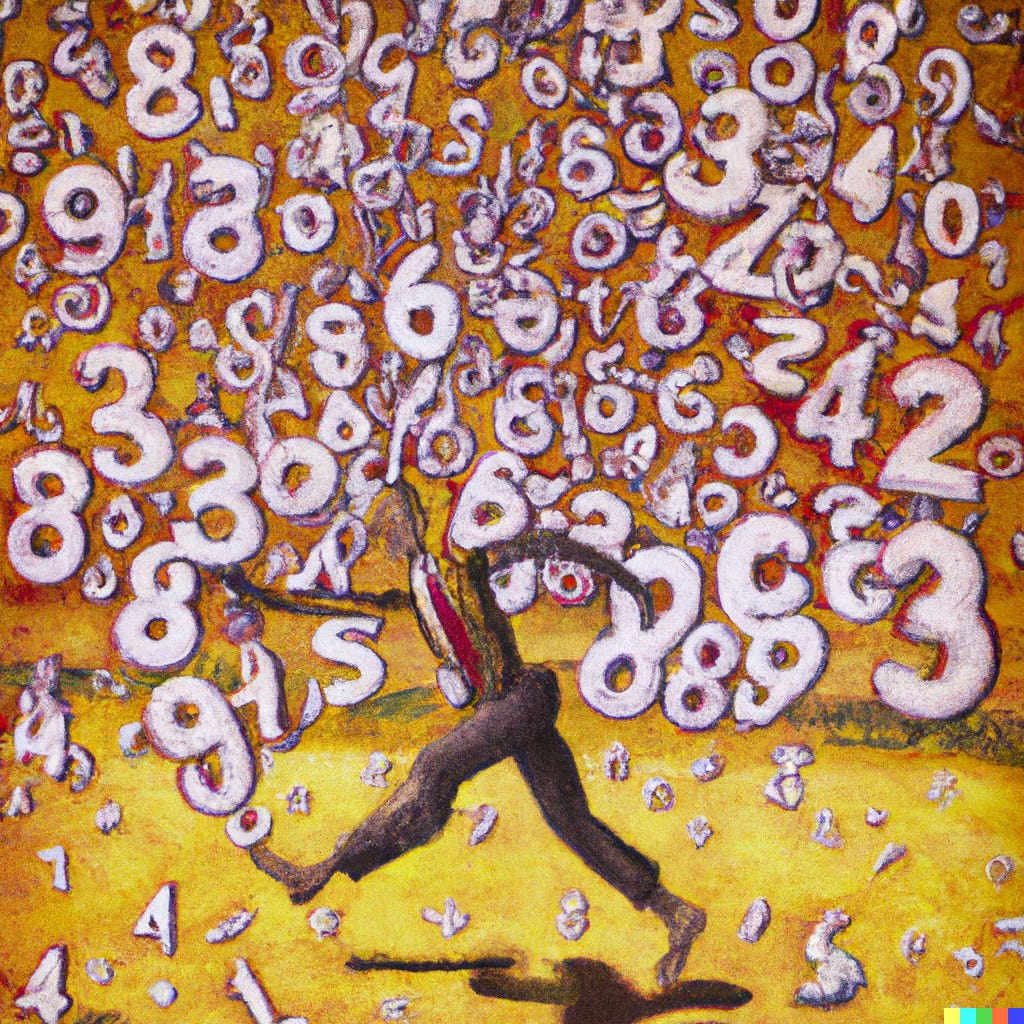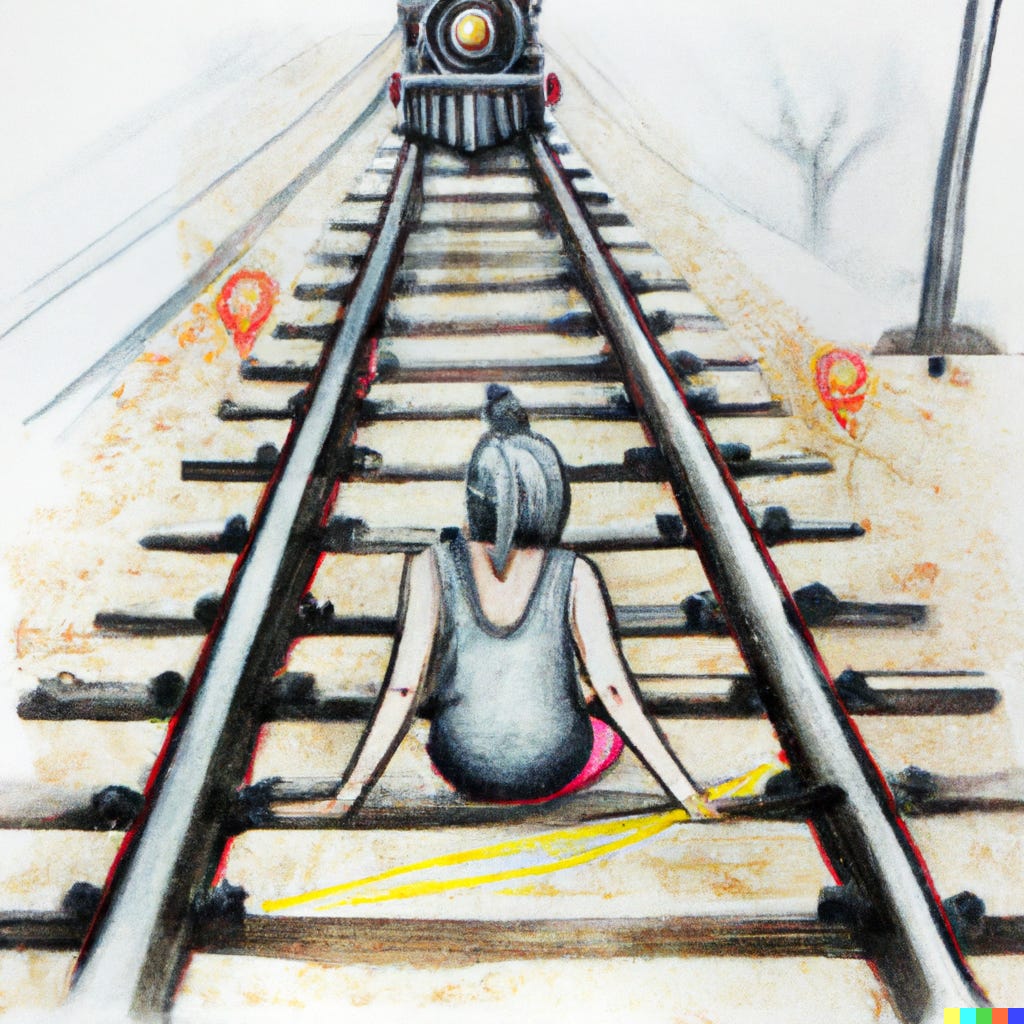Dirty Thoughts: Railroads, railroaders, and being railroaded
A diatribe about Human Problems
Dear Reader,
There will be no theDirt Weekly this week. I am happy to say that it is because I am swamped with pressing, urgent, and potentially very profitable real estate business which demands my attention (I told you the good deals were a comin’).
I do, however, have a previously drafted essay about the railroad mess ready to go. I was questioning whether to put it out there at all but what the hell. I must gather courage and venture forth and risk failure and looking the fool lest I stagnate in a pool of obscurity. I’d appreciate your thoughts on this issue in the comments section if you can spare a second.
Also, if you haven’t yet, I highly recommend the Substack app for all of my readers. It is a better way to consume and interact with a fantastic stable of authors and thinkers (of which I am at the very bottom tier). Regimes change and the way that all of us consume and discuss the news is changing: all the smart kids are on Substack.
Best,
Dustin
I hear that train a comin’. Comin’ round the bend. And I ain’t seen the sunshine in, I don’t know when…
I tried not to write it. I tried to forget it. But I am a moth and this issue is a bright light in the dark. I couldn’t resist. So here we are. Folks, this is an editorial about labor and railroads. Yes, it is related to real estate but only because our supply chains gird our entire economy and so effect everything. So too demographics and the way that all of us work and earn and profit. I feel this to be a very important topic, but I don’t blame you if you stop here and move on. Perhaps I should file this one under ‘man yells at clouds’.
Dear reader, I am a Dirty nerd. I read a LOT of history. I read a LOT of economics. I read a LOT of psychology. The more I read, the more I learn, the more unsure I become about almost everything. With every byte of knowledge I add to my brain I stand more in awe and consternation (and sometimes sheer terror) of humanity. Also of our universe and the elegant chaos that defines all of it. When I scratch the surface of how small each of us really is, my deepest convictions become shaky and unstable. Except for this: the more I read and study, the more sure I become that our biggest problems are Human Problems. Not math problems.
My biggest gripe with economists, accountants, and the policy-makers that they advise is how each occupation frames our economy, our Culture of Exchange, as a function. Solve for X and Wham-O, we have a solution. And while I do love a spreadsheet and a chart (with which to fool myself into thinking that I can uncover pattern and therefore some hidden knowledge), I am forcefully reminded anytime that I speak with a real life person (e.g. a client) that economics and markets and prices and all of it are first and foremost Human Problems.
But Human Problems are Dirty and messy and frustrating and damned hard to solve. Which is why numbers are seductive. If we can just boil all of these feelings into a number, wouldn’t decisions be easy and life grand? Yes. But you can’t. And you shouldn’t. Because mathematics, while wonderful and very very helpful in the discovery of our universe and making stuff and bettering our condition, cannot bottle humanity. You cannot squeeze emotion into the prison of cold calculus. You cannot solve for X and tame Homo sapiens . And you can only ignore the humanity of our species for so long before a Human Problem becomes outright catastrophe. Just ask Louis XVI. Or Tsar Nicholas II.
What? Did you hear that? It’s the feint rumble of a freight train, kids. Big one by the sound of it. At speed. And we are all tied to the tracks. Gonna be hard to stop before something bad happens. I wrote the following last week:
The down and Dirty is that all of the railroad strikes that I’ve been writing about over the past few months came to a head this week. Railroad companies and labor unions had until December 9th to come to an agreement on a contract. They were not going to make it. The sticky issue is sick days (of which railroad employees receive none). The impasse caused the issue to suddenly became a cyst of cataclysmic proportions. The pimple was so nasty that Congress decided to, you know, cover it with make-up and then pat themselves on the back. Which is to say that they voted to cram a labor contract down the throats of the railroad workers.
Think of that for a second: a supposedly pro-labor, Democrat-run congress and president voted and then signed into LAW legislation to force unionized labor to accept a contract that they (the labor unions) were planning to vote NOT to accept. That should tell you how big of a deal it is for our entire economy, for every last person in this nation, that railroads continue to function. Biden Pelosi Schumer LLP completely threw railroad labor under the bus to save the economy. And they absolutely had to do it.
Now enter a further explanation. Enter the concept of Precision Scheduled Railroading. Enter railroad corporations and profit. Enter railroad employees and unions. Enter all of us and how we perceive wealth and money and how it should go around. Mix them together and add a splash of anger. Of resentment. And now we have a big (albeit a rather old-fashioned) Human Problem morphing into a possible catastrophe.
Here is a description of Precision Scheduled Railroading (P.S.R.) from a pretty good article about the issue from NY Mag (I highly recommend reading the entire article to get a solid grip on the bar):
P.S.R. is an operational strategy that aims to minimize the ratio between railroads’ operating costs and their revenues through various cost-cutting and (ostensibly) efficiency-increasing measures. The basic idea is to transport more freight using fewer workers and railcars.
Soooo… get as much stuff hauled with as few people as possible. Got it. Seems reasonable. But here’s the rub about PSR. Bean counters and efficiency experts created an extremely efficient system. When it works, man it works great. It is cheap and fast and keeps costs low. Profits increase and so too shareholder value. But the problem with extremely efficient systems is that regimes change. Environments change. Employment markets become competitive. Etc. Things like COVID and war and global realignments come about that foul the machinery of perfect systems. The chickens, as they always do, will come home to roost. In this case the chickens are the employees that make the trains run on time and the unions that represent them1. And their beef is not pay but the very simple matter of sick leave.
At first blush I thought all of this was a simple matter of union leveraging for more pay. But after digging a bit deeper, I learned that a railroad engineer can risk discipline for being sick. This is not a 19th century coal mine, folks. A few days of sick leave should not be a high bar. Not to mention that I’d really rather NOT have the person operating that chugging, multi-ton behemoth be delirious with flu for fear of getting cross with the boss. From the same NY mag article:
The key points of contention in those talks have been scheduling in general and the provision of paid leave in particular. Unlike nearly 80 percent of U.S. laborers, railroad employees are not currently guaranteed a single paid sick day. Rather, if such workers wish to recuperate from an illness or make time to see a doctor about a nagging complaint, they need to use vacation time, which must be requested days in advance. In other words, if a worker wants to take time off to recover from the flu, they need to notify their employer of this days before actually catching the virus. Given that workers’ contracts do not include paid psychic benefits, this is a tall order.
Also let’s not forget that personal vacation can be denied. Sick leave cannot. Scroll the socials and read the accounts of railroad workers and their families. I did. I had no idea that being sick might cost you a job. I sure as hell wouldn’t work in that industry. There is also this from an op-ed in Newsweek written by an actual railroader:
When you are in train service as a conductor or engineer, you are subject to laws limiting how many hours at a time you can work. We are not allowed to work more than 12 hours straight. We have to be given at least 10 hours off after a 12 hour shift. Federal law allows us to work six shifts in a row, and after that sixth shift, we are supposed to get a mandatory 48 hours off.
The problem is, something that happens all the time is you'll work five shifts, and then your bosses will wait longer than 24 hours to call you in for your sixth shift. And because it's longer than 24 hours—sometimes by as little as a minute—that starts the clock of your shifts all over again. You're back to square one. It's their trick for getting us to work ten, fifteen, and sometimes more days in a row.
Here’s another rub: if you, like me, listen and agree with Peter Zehein’s approach to the future and our national demographics, you will know that our national labor regime is changing. Ours is a system built decades ago on the foundation of a large and seemingly endless labor pool. But we no longer enjoy the glut of working-aged people of days yore. And we won’t again anytime soon. Boomers are retiring ne’er to return. And companies must fight over who remains. It seems that our railroad corporations have not received the memo. It seems that they’ve neglected to consider that they can no longer treat their labor like indentured serfs with no other options2. Dear reader, corporations can no longer treat their festering human problem as a math problem. From a Wall Street Journal article about railroad corporations:
“Railroads said they’re all trying to grow, to add more head count, but ultimately, they can’t really create new demand. They’re just trying to match their plans, their assets, with what’s coming to the network. As you can imagine, it’s quite hard,” said Brian Ossenbeck, an analyst at JPMorgan.
Folks, call me old-fashioned but a leader (which all employers are) should treat their people with decency. One needn’t go overboard. One needn’t be a VC-backed tech company with catered lunches, bottomless lattes, and nap time. All you have to be is decent. After all employers, look around at the labor market: these days it seems like you need good employees more than they need your position. And if you were to jump the small hurdle of decency, perhaps you wouldn’t be forced to rely on the force of government to ensure your profit. Oooh, boy do I have heartburn with this. The last thing we need is a bunch of politicians negotiating employment for the rest of us. That is sure to end up sideways. And I know for damned sure that all government employees have sick leave so voting into law a package with none is rich.
Dear reader, this is an important issue. For one, railroads are the major arteries of our economy. We cannot survive without them. Block an artery in a body and what happens? Stroke. Loss of limb. Death. Something catastrophic, correct? Now consider that your nation’s most important arteries are now run by some very angry, very upset, very discontented people whose terms were forced upon them by our government. It’s not a recipe for a healthy supply chain or economy.
Every day the tracks rumble and the engines haul. And almost none of us give them a second thought unless we are inconvenienced at a railroad crossing. But we might be forced to notice very soon. Like a stroke victim very suddenly pays attention to his blockage.
I pray that the corporate suits within the railroad companies look at the prevailing winds and see the problem for what it is (there are seeds of hope, see tweet below). Dear reader, Precision Scheduled Railroading is a math problem that turned into a Human Problem. And the stakes are getting pretty high. The costs are rising. And it is not just railroads that are at stake. Whatever your feelings about labor and unions and corporations, etc, I hope that you will focus on the big takeaway from this story: the world is changing, regimes are changing, economics (our Culture of Exchange) are changing, and power dynamics are changing. And the inputs of profit functions will change with it.


This is an inflationary problem. The Fed can only do so much to drive down short-term demand and bring the inflation that resulted from too much money and stimulus under control. But when (if?) interest rates steady and the dust settles, the old problems will still be there staring us all in the face. The world is not what it was yesterday (it never is).
This entire rail problem is indicative of the conviction that I have that we will endure higher inflation over a very long term. Over the last few decades, efficiency was maximized and costs were minimized. But efficiency is rarely resilient. And the coming transition will raise costs for us all. For railroad employees, I’d wager an ever-inflating dollar that sick leave is in your future. Which is decent. And as it should be.
Further reading:
Morning Ag Clips: Ag Organizations Comment on Rail Strike Actions
Wall Street Journal: Railroads Focus on Stabilizing Workforce after Strike is Averted
I feel compelled to mention here that I am not a labor shill. While I have an enduring soft spot for the little guy, for the blue-collared leather-handed peasants from whence I sprang, and so too in all David v Goliath stories (as do most Americans I think), I have no shortage of bad things to say about unions. They, just like the corporations they oppose, rose from noble intent only to become so much bloated bloviating bureaucratic bullshit hustlers. And union policy can make business so inefficient and costly that they drive the industry and jobs right out of our nation. Unions, like corporations, are chalk full of Human Problems. Such is the way of man’s organizations and the nature of money and power.
Fun fact: after the bubonic plague took more than half of the world‘s population early in the last millennium, peasants enjoyed some of the best perquisites in history. Landlords were desperate for labor, and there were too few workers to go around. We might all take that as a lesson in the face of generally worsening global demographics.








Dirty Nerd :)
and you are totally right… These significant matters are always fundamentally a human problem. Probably one of the singular reason the church endures is - at its best – it gets too name of that and unpack the implications.
My neighbor gave me that Zeihan book. Just begun...
thanks for this! Important to raise visibly the real human challenges/wrongs faced by the workers themselves.